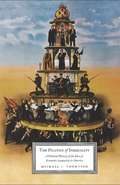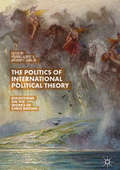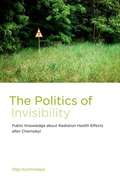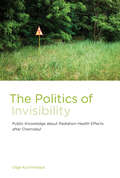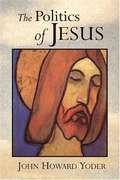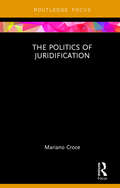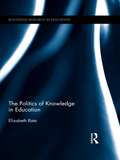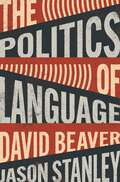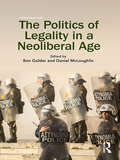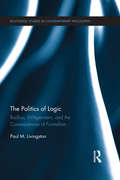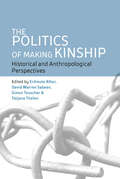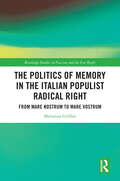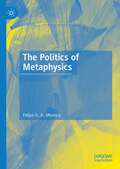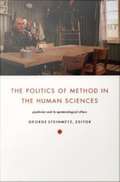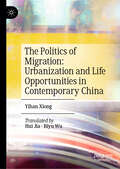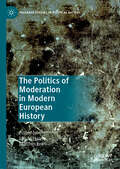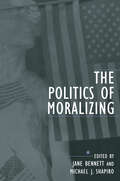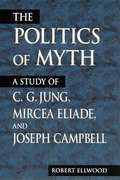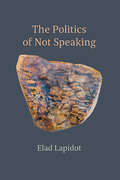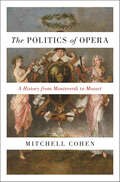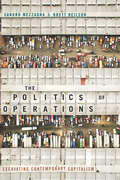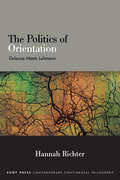- Table View
- List View
The Politics of Inequality: A Political History of the Idea of Economic Inequality in America
by Michael ThompsonSince the early days of the American republic, political thinkers have maintained that a grossly unequal division of property, wealth, and power would lead to the erosion of democratic life. Yet over the past thirty-five years, neoconservatives and neoliberals alike have redrawn the tenets of American liberalism. Nowhere is this more evident than in our current mainstream political discourse, in which the politics of economic inequality are rarely discussed.In this impassioned book, Michael J. Thompson reaches back into America's rich intellectual history to reclaim the politics of inequality from the distortion of recent American conservatism. He begins by tracing the development of the idea of economic inequality as it has been conceived by political thinkers throughout American history. Then he considers the change in ideas and values that have led to the acceptance and occasional legitimization of economic divisions. Thompson argues that American liberalism has made a profound departure from its original practice of egalitarian critique. It has all but abandoned its antihierarchical and antiaristocratic discourse. Only by resuscitating this tradition can democracy again become meaningful to Americans. The intellectuals who pioneered egalitarian thinking in America believed political and social relations should be free from all forms of domination, servitude, and dependency. They wished to expose the antidemocratic character of economic life under capitalism and hoped to prevent the kind of inequalities that compromise human dignity and freedom-the core principles of early American politics. In their wisdom is a much broader, more compelling view of democratic life and community than we have today, and with this book, Thompson eloquently and adamantly fights to recover this crucial strand of political thought. In this impassioned book, Michael J. Thompson reaches back into America's rich intellectual history to reclaim the politics of inequality from the distortion of recent American conservatism. He begins by tracing the development of the idea of economic inequality as it has been conceived by political thinkers throughout American history. Then he considers the change in ideas and values that have led to the acceptance and occasional legitimization of economic divisions. Thompson argues that American liberalism has made a profound departure from its original practice of egalitarian critique; it has all but abandoned its antihierarchical and antiaristocratic discourse. Only by resuscitating this tradition can democracy again become meaningful to Americans. The intellectuals who pioneered egalitarian thinking in America believed political and social relations should be free from all forms of domination, servitude, and dependency. They wished to expose the antidemocratic character of economic life under capitalism and hoped to prevent the kind of inequalities that compromise human dignity and freedom—the core principles of early American politics. In their wisdom is a much broader, more compelling view of democratic life and community than we have today, and with this book, Thompson eloquently and adamantly fights to recover this crucial strand of political thought.
The Politics of International Political Theory: Reflections On The Works Of Chris Brown
by Mathias Albert Anthony F. Lang Jr.This book assesses the impact of the work of Chris Brown in the field of International Political Theory. The volume engages with general issues of IPT as well as basic issues such as the use and role of practical reasoning and presents a nuanced understanding about issues regarding the legitimacy of war and violence. It explores questions that pertain to human rights, morality, and ethics, and generally an outlook for devising a ‘better’ world. The project is ideal for audiences with interest in International Relations, Ethics and Morality Studies and International Political Theory.
The Politics of Invisibility
by Olga KuchinskayaBefore Fukushima, the most notorious large-scale nuclear accident the world had seenwas Chernobyl in 1986. The fallout from Chernobyl covered vast areas in the Northern Hemisphere,especially in Europe. Belarus, at the time a Soviet republic, suffered heavily: nearly a quarter ofits territory was covered with long-lasting radionuclides. Yet the damage from the massive falloutwas largely imperceptible; contaminated communities looked exactly like noncontaminated ones. Itcould be known only through constructed representations of it. In The Politics ofInvisibility, Olga Kuchinskaya explores how we know what we know about Chernobyl,describing how the consequences of a nuclear accident were made invisible. Her analysis shedsvaluable light on how we deal with other modern hazards -- toxins or global warming -- that arelargely imperceptible to the human senses. Kuchinskaya describes the production ofinvisibility of Chernobyl's consequences in Belarus -- practices that limit public attention toradiation and make its health effects impossible to observe. Just as mitigating radiologicalcontamination requires infrastructural solutions, she argues, the production and propagation ofinvisibility also involves infrastructural efforts, from redefining the scope and nature of theaccident's consequences to reshaping research and protection practices. Kuchinskaya finds vast fluctuations in recognition, tracing varyingly successfulefforts to conceal or reveal Chernobyl's consequences at different levels -- among affectedpopulations, scientists, government, media, and international organizations. The production ofinvisibility, she argues, is a function of power relations.
The Politics of Invisibility: Public Knowledge about Radiation Health Effects after Chernobyl (Infrastructures)
by Olga KuchinskayaLessons from the massive Chernobyl nuclear accident about how we deal with modern hazards that are largely imperceptible.Before Fukushima, the most notorious large-scale nuclear accident the world had seen was Chernobyl in 1986. The fallout from Chernobyl covered vast areas in the Northern Hemisphere, especially in Europe. Belarus, at the time a Soviet republic, suffered heavily: nearly a quarter of its territory was covered with long-lasting radionuclides. Yet the damage from the massive fallout was largely imperceptible; contaminated communities looked exactly like noncontaminated ones. It could be known only through constructed representations of it. In The Politics of Invisibility, Olga Kuchinskaya explores how we know what we know about Chernobyl, describing how the consequences of a nuclear accident were made invisible. Her analysis sheds valuable light on how we deal with other modern hazards—toxins or global warming—that are largely imperceptible to the human senses.Kuchinskaya describes the production of invisibility of Chernobyl's consequences in Belarus—practices that limit public attention to radiation and make its health effects impossible to observe. Just as mitigating radiological contamination requires infrastructural solutions, she argues, the production and propagation of invisibility also involves infrastructural efforts, from redefining the scope and nature of the accident's consequences to reshaping research and protection practices. Kuchinskaya finds vast fluctuations in recognition, tracing varyingly successful efforts to conceal or reveal Chernobyl's consequences at different levels—among affected populations, scientists, government, media, and international organizations. The production of invisibility, she argues, is a function of power relations.
The Politics of Jesus: Vicit Agnus Noster 2nd edition
by John H. YoderUsing the texts of the New Testament, Yoder critically examines the traditional portrait of Jesus as an apolitical figure and attempts to clarify the true impact of Jesus' life, work, and teachings on his disciples' social behavior.
The Politics of Juridification: The Actor's Revenge (Law and Politics)
by Mariano CroceThe Politics of Juridification offers a timely contribution to debates about how politics is being affected by the increasing relevance of judicial bodies to the daily administration of Western political communities. While most critical analyses portray juridification as a depoliticizing, de-democratizing transferral of political authority to the courts (whether national or international), this book centres on the workable ambivalence of such a far-reaching phenomenon. While juridification certainly intensifies the power and competences of judicial bodies to the disadvantage of representative political institutions, it cannot be easily reduced to the demise of democratic politics. By focusing on the multiple ways in which social agents make use of the law, The Politics of Juridification teases out the agential and transformative aspects of the various negotiations social agents engage with legal institutions with a view to obtaining political visibility. In particular, the book homes in on two seemingly distinct phenomena: on one hand, the regulation of sexuality and emerging kinship formations; on the other, the fragmentation of legal settings due to the claims to legal autonomy advanced by sub-state cultural and religious groups. By doing so, the book makes the case for an unexpected convergence between the struggles for legal recognition of sexual minorities and religious and cultural minorities. The conclusion is that juridification does entail normalization and favour the infiltration of law into the social realm. But because of its ambivalent nature, it can and does serve as an alternative vehicle for social change – one that attaches more importance to how social agents produce law on a daily basis and how this law permeates official legal orders.
The Politics of Knowledge in Education (Routledge Research in Education)
by Elizabeth RataThis book explores the decline of the teaching of epistemic, conceptual knowledge in schools, its replacement with everyday social knowledge, and its relation to changes in the division of labor within the global economy. It argues that the emphasis on social knowledge in postmodern and social constructionist pedagogy compounds the problem, and examines the consequences of these changes for educational opportunity and democracy itself.
The Politics of Language
by Jason Stanley David BeaverA provocative case for the inherently political nature of languageIn The Politics of Language, David Beaver and Jason Stanley present a radical new approach to the theory of meaning, offering an account of communication in which political and social identity, affect, and shared practices play as important a role as information. This new view of language, they argue, has dramatic consequences for free speech, democracy, and a range of other areas in which speech plays a central role.Drawing on a wealth of disciplines, The Politics of Language argues that the function of speech—whether in dialogue, larger group interactions, or mass communication—is to attune people to something, be it a shared reality, emotion, or identity. Reconceptualizing the central ideas of pragmatics and semantics, Beaver and Stanley apply their account to a range of phenomena that defy standard frameworks in linguistics and philosophy of language—from dog whistles and covert persuasion to echo chambers and genocidal speech. The authors use their framework to show that speech is inevitably political because all communication is imbued with the resonances of particular ideologies and their normative perspectives on reality.At a time when democracy is under attack, authoritarianism is on the rise, and diversity and equality are being demanded, The Politics of Language offers a powerful new vision of the language of politics, ideology, and protest.
The Politics of Legality in a Neoliberal Age
by Ben Golder Daniel McLoughlinThis volume addresses the relationship between law and neoliberalism. Assembling work from established and emerging legal scholars, political theorists, philosophers, historians, and sociologists from around the world – including the Americas, Australia, Europe, and the United Kingdom – it addresses the conceptual, legal, and political relationships between liberal legality and neoliberal economics. More specifically, the book analyses the role that legality plays in the dominant economic force of our time, offering both a legal corrective to scholarship in economics and political economy that has paid insufficient attention to legal ideas, and, at the same time, a political economic corrective to legal scholarship that has only recently turned to theorizing neoliberalism. It will be of enormous interest to those working at the intersection of law and politics in our neoliberal age.
The Politics of Logic: Badiou, Wittgenstein, and the Consequences of Formalism (Routledge Studies in Contemporary Philosophy)
by Paul LivingstonIn this book, Livingston develops the political implications of formal results obtained over the course of the twentieth century in set theory, metalogic, and computational theory. He argues that the results achieved by thinkers such as Cantor, Russell, Godel, Turing, and Cohen, even when they suggest inherent paradoxes and limitations to the structuring capacities of language or symbolic thought, have far-reaching implications for understanding the nature of political communities and their development and transformation. Alain Badiou's analysis of logical-mathematical structures forms the backbone of his comprehensive and provocative theory of ontology, politics, and the possibilities of radical change. Through interpretive readings of Badiou's work as well as the texts of Giorgio Agamben, Jacques Lacan, Jacques Derrida, Gilles Deleuze, and Ludwig Wittgenstein, Livingston develops a formally based taxonomy of critical positions on the nature and structure of political communities. These readings, along with readings of Parmenides and Plato, show how the formal results can transfigure two interrelated and ancient problems of the One and the Many: the problem of the relationship of a Form or Idea to the many of its participants, and the problem of the relationship of a social whole to its many constituents.
The Politics of Making Kinship: Historical and Anthropological Perspectives
by Tatjana Thelen Erdmute Alber, David Warren Sabean, Simon TeuscherThe long tradition of Western political thought included kinship in models of public order, but the social sciences excised it from theories of the state, public sphere, and democratic order. Kinship has, however, neither completely disappeared from the political cultures of the West nor played the determining social and political role ascribed to it elsewhere. Exploring the issues that arise once the divide between kinship and politics is no longer taken for granted, The Politics of Making Kinship demonstrates how political processes have shaped concepts of kinship over time and, conversely, how political projects have been shaped by specific understandings, idioms and uses of kinship. Taking vantage points from the post-Roman era to early modernity, and from colonial imperialism to the fall of the Berlin Wall and beyond this international set of scholars place kinship centerstage and reintegrate it with political theory.
The Politics of Making Kinship: Historical and Anthropological Perspectives
by Tatjana Thelen Erdmute Alber, David Warren Sabean, Simon TeuscherThe long tradition of Western political thought included kinship in models of public order, but the social sciences excised it from theories of the state, public sphere, and democratic order. Kinship has, however, neither completely disappeared from the political cultures of the West nor played the determining social and political role ascribed to it elsewhere. Exploring the issues that arise once the divide between kinship and politics is no longer taken for granted, The Politics of Making Kinship demonstrates how political processes have shaped concepts of kinship over time and, conversely, how political projects have been shaped by specific understandings, idioms and uses of kinship. Taking vantage points from the post-Roman era to early modernity, and from colonial imperialism to the fall of the Berlin Wall and beyond this international set of scholars place kinship centerstage and reintegrate it with political theory.
The Politics of Memory in the Italian Populist Radical Right: From Mare Nostrum to Mare Vostrum (Routledge Studies in Fascism and the Far Right)
by Marianna GriffiniThe Politics of Memory in the Italian Populist Radical Right examines the role of colonial memory in the contemporary Italian populist radical right, which includes the Lega and Fratelli d’Italia (FdI). The book originally adopts postcolonialism as an analytical framework to critically examine which roles colonial memory plays in the Italian populist radical right. Considering the timeframe between 2013 and 2021, this book suggests that the contemporary Italian populist radical right selectively shaped its memory of the colonial past, expunging the most difficult aspects from it. The fact that the Italian populist radical right parties examined do not fully acknowledge the controversial aspects of Italy’s colonial past, which are bracketed off discourse, may contribute to the deployment of colonial discourse by these same parties when discussing immigration. From this Italian case study, broader implications can be drawn regarding the role of colonial memory in political discourse, which is a topical matter across Europe. The book will be of interest to those studying populism, the radical right, Italian politics and history, colonialism, and the politics of memory.
The Politics of Metaphysics
by Felipe G. MoreiraSince immemorial times, persons have been engaged in disputes in metaphysics. This book reacts to this fact by supporting five theses. Thesis 1 is that disputes are micro-wars that have a significant social importance; they involve conflicting parties who may resort to some kind of violence and depend on normative factors. Thesis 2 is that disputes can be approached from right-wing or left-wing stances. Thesis 3 is that the grounds for endorsing an approach to a dispute are problematic starting points that may be rationally rejected. Thesis 4 is that disputes have an incommensurable greatness. Thesis 5 is that right-wing approaches to disputes may be less appealing than the left-wing one championed by the book for those who endorse that one is to avoid expressing “subtle” violence. This is the violence expressed by those who suggest that others who disagree with one’s criteria to deal with disputes fall short of logos or act as if such others did not exist.
The Politics of Method in the Human Sciences: Positivism and Its Epistemological Others
by George SteinmetzThe Politics of Method in the Human Sciences provides a remarkable comparative assessment of the variations of positivism and alternative epistemologies in the contemporary human sciences. Often declared obsolete, positivism is alive and well in a number of the fields; in others, its influence is significantly diminished. The essays in this collection investigate its mutations in form and degree across the social science disciplines. Looking at methodological assumptions field by field, individual essays address anthropology, area studies, economics, history, the philosophy of science, political science and political theory, and sociology. Essayists trace disciplinary developments through the long twentieth century, focusing on the decades since World War II. Contributors explore and contrast some of the major alternatives to positivist epistemologies, including Marxism, psychoanalysis, poststructuralism, narrative theory, and actor-network theory. Almost all the essays are written by well-known practitioners of the fields discussed. Some essayists approach positivism and anti-positivism via close readings of texts influential in their respective disciplines. Some engage in ethnographies of the present-day human sciences; others are more historical in method. All of them critique contemporary social scientific practice. Together, they trace a trajectory of thought and method running from the past through the present and pointing toward possible futures. Contributors. Andrew Abbott, Daniel Breslau, Michael Burawoy, Andrew Collier , Michael Dutton, Geoff Eley, Anthony Elliott, Stephen Engelmann, Sandra Harding, Emily Hauptmann, Webb Keane, Tony Lawson, Sophia Mihic, Philip Mirowski, Timothy Mitchell, William H. Sewell Jr. , Margaret R. Somers, George Steinmetz, Elizabeth Wingrove
The Politics of Migration: Urbanization and Life Opportunities in Contemporary China
by Yihan XiongBased on extensive fieldwork and longitudinal studies, this book posits that the household registration (hukou) system is a fundamental institutional arrangement in contemporary China. It employs the theoretical framework of local citizenship to analyze the rights and conditions of the migrant population amidst urbanization. Local citizenship functions as both a governance classification and a qualification for access to public resources, influencing not only migration patterns but also the social mobility of various migrant classes. Importantly, the widely discussed education policies for migrant children are part of a broader framework of national migrant management and local industrial policies.
The Politics of Moderation in Modern European History (Palgrave Studies in Political History)
by Ido De Haan Matthijs LokThis book charts the varieties of political moderation in modern European history from the French Revolution to the present day. It explores the attempts to find a middle way between ideological extremes, from the nineteenth-century Juste Milieu and balance of power, via the Third Ways between capitalism and socialism, to the current calls for moderation beyond populism and religious radicalism. The essays in this volume are inspired by the widely-recognized need for a more nuanced political discourse. The contributors demonstrate how the history of modern politics offers a range of experiences and examples of the search for a middle way that can help us to navigate the tensions of the current political climate. At the same time, the volume offers a diagnosis of the problems and pitfalls of Third Ways, of finding the middle between extremes, and of the weaknesses of the moderate point of view.
The Politics of Moralizing
by Jane Bennett Michael J. ShapiroThe Politics of Moralizing issues a stern warning about the risks of speaking, writing, and thinking in a manner too confident about one's own judgments and asks, "Can a clear line be drawn between dogmatism and simple certainty and indignation?" Bennett and Shapiro enter the debate by questioning what has become a popular, even pervasive, cultural narrative told by both the left and the right: the story of the West's moral decline, degeneration, or confusion. Contributors explore the dynamics and dilemmas of moralizing by advocates of patriotism, environmental protection, and women's rights while arguing that the current discourse gives free license to self-aggrandizement, cruelty, vengeance and punitiveness and a generalized resistance to or abjection of diversity.
The Politics of Myth: A Study of C. G. Jung, Mircea Eliade, and Joseph Campbell
by Robert EllwoodEllwood (Religion, U. of Southern California) delves into the political views implicit in the mythological theories of probably the three best-known popularizers of myth in the 20th century. He points that all three emerged from the anti-modern pessimism and romanticism that also generated European fascism, and have all been accused of holding fascists and anti-Semitic sentiments. He assesses those charges in light of their entire career and lifetime contribution.
The Politics of Not Speaking
by Elad LapidotIn contrast to the common understanding of politics as a domain of speaking, reveals an alternative tradition where the spoken word fails, collapses, breaks (i.e., a politics of not speaking).According to a common conception, modern politics is based on speaking, on discussion and rational argumentation-on "logos." In contrast, The Politics of Not Speaking argues that politics is based not on speaking but on the suspension of conversation, on the break of rational discourse, on "logoclasm"-on politics of not speaking. Elad Lapidot presents the notion of politics as logoclasm through readings of five canonic thinkers of the twentieth century: Carl Schmitt, Martin Heidegger, Frantz Fanon, Gayatri Spivak, and Jacques Derrida. Tracing the development of the politics of not speaking from the 1930s to the 1990s, he shows how the notion of logoclasm, the rupture of rational discussion, explains key notions in modern politics, such as sovereignty, law, the state, violence, war, race, colonialism, decolonization, and boycott, and sheds light on current debates concerning the Boycott, Divestment, Sanctions (BDS) movement and the Gaza war.
The Politics of Objectivity
by Peter J. SteinbergerModern political conflict characteristically reflects and represents deep-seated but also unacknowledged and un-analyzed disagreements about what it means to be 'objective'. In defending this proposition, Peter J. Steinberger seeks to reaffirm the idea of rationalism in politics by examining important problems of public life explicitly in the light of established philosophical doctrine. The Politics of Objectivity invokes, thereby, an age-old, though now widely ignored, tradition of western thought according to which all political thinking is inevitably embedded in and underwritten by larger structures of metaphysical inquiry. Building on earlier studies of the idea of the state, and focusing on highly contested practices of objectivity in judgement, this book suggests that political conflict is an essentially discursive enterprise deeply implicated in the rational pursuit of theories about how things in the world really are.
The Politics of Opera: A History from Monteverdi to Mozart
by Mitchell CohenA wide-ranging look at the interplay of opera and political ideas through the centuriesThe Politics of Opera takes readers on a fascinating journey into the entwined development of opera and politics, from the Renaissance through the turn of the nineteenth century. What political backdrops have shaped opera? How has opera conveyed the political ideas of its times? Delving into European history and thought and an array of music by such greats as Lully, Rameau, and Mozart, Mitchell Cohen reveals how politics—through story lines, symbols, harmonies, and musical motifs—has played an operatic role both robust and sotto voce.Cohen begins with opera's emergence under Medici absolutism in Florence during the late Renaissance—where debates by humanists, including Galileo's father, led to the first operas in the late sixteenth century. Taking readers to Mantua and Venice, where composer Claudio Monteverdi flourished, Cohen examines how early operatic works like Orfeo used mythology to reflect on governance and policy issues of the day, such as state jurisdictions and immigration. Cohen explores France in the ages of Louis XIV and the Enlightenment and Vienna before and during the French Revolution, where the deceptive lightness of Mozart's masterpieces touched on the havoc of misrule and hidden abuses of power. Cohen also looks at smaller works, including a one-act opera written and composed by philosopher Jean-Jacques Rousseau. Essential characters, ancient and modern, make appearances throughout: Nero, Seneca, Machiavelli, Mazarin, Fenelon, Metastasio, Beaumarchais, Da Ponte, and many more.An engrossing book that will interest all who love opera and are intrigued by politics, The Politics of Opera offers a compelling investigation into the intersections of music and the state.
The Politics of Operations: Excavating Contemporary Capitalism
by Sandro Mezzadra Brett NeilsonIn The Politics of Operations Sandro Mezzadra and Brett Neilson investigate how capital reshapes its relation with politics through operations that enable the extraction and exploitation of mineral resources, labor, data, and cultures. They show how capital—which they theorize as a direct political actor—operates through the logistical organization of relations between people, property, and objects as well as through the penetration of financialization into all realms of economic life. Mezzadra and Neilson present a capacious analysis of a wide range of issues, from racial capitalism, the convergence of neoliberalism and nationalism, and Marx's concept of aggregate capital to the financial crisis of 2008 and how colonialism, empire, and globalization have shaped the modern state since World War II. In so doing, they illustrate the distinctive rationality and logics of contemporary capitalism while calling for a politics based on collective institutions that exist outside the state.
The Politics of Orientation: Deleuze Meets Luhmann (SUNY series in Contemporary Continental Philosophy)
by Hannah RichterThe Politics of Orientation provides the first substantial exploration of a surprising theoretical kinship and its rich political implications, between Gilles Deleuze's philosophy and the sociological systems theory of Niklas Luhmann. Through their shared theories of sense, Hannah Richter draws out how the works of Luhmann and Deleuze complement each other in creating worlds where chaos is the norm and order the unlikely and yet remarkably stable exception. From the encounter between Deleuze and Luhmann, Richter develops a novel take on postfoundational ontology where subjects and societies unfold in self-productive relations of sense against a background of complexity. The Politics of Orientation breaks and rebuilds theoretical alliances by reading core concepts and thinkers of Continental Philosophy, from Leibniz to Whitehead and Marx, through this encounter. Most importantly, the book puts Luhmann and Deleuze to work to offer urgently needed insight into the rise of post-truth populism. In our complex democratic societies, Richter argues, orientation against complexity has become the ground of political power, privileging the simplistic narratives of the populist right.
